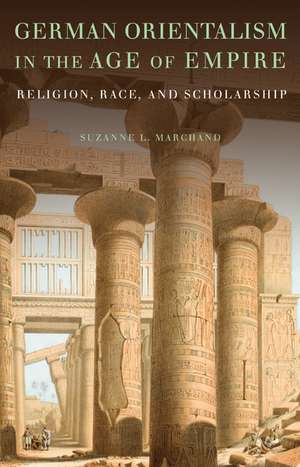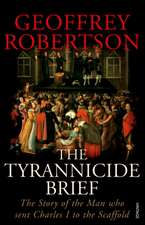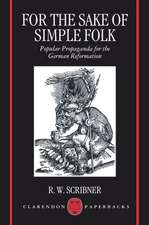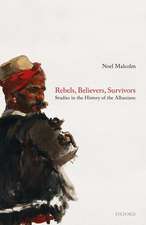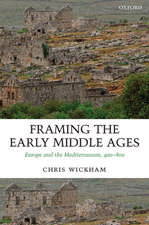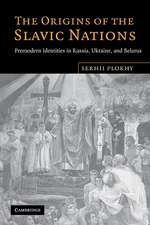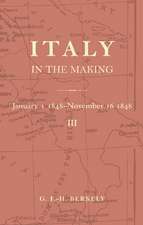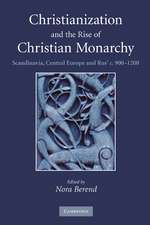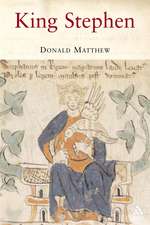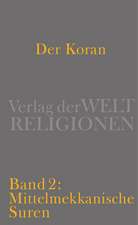German Orientalism in the Age of Empire: Religion, Race, and Scholarship: Publications of the German Historical Institute
Autor Suzanne L. Marchanden Limba Engleză Hardback – 16 aug 2009
| Toate formatele și edițiile | Preț | Express |
|---|---|---|
| Paperback (1) | 299.45 lei 6-8 săpt. | |
| Cambridge University Press – 8 aug 2010 | 299.45 lei 6-8 săpt. | |
| Hardback (1) | 464.03 lei 6-8 săpt. | |
| Cambridge University Press – 16 aug 2009 | 464.03 lei 6-8 săpt. |
Din seria Publications of the German Historical Institute
- 14%
 Preț: 757.52 lei
Preț: 757.52 lei - 8%
 Preț: 530.72 lei
Preț: 530.72 lei -
 Preț: 283.52 lei
Preț: 283.52 lei - 14%
 Preț: 757.52 lei
Preț: 757.52 lei -
 Preț: 352.63 lei
Preț: 352.63 lei - 11%
 Preț: 695.06 lei
Preț: 695.06 lei -
 Preț: 207.41 lei
Preț: 207.41 lei -
 Preț: 282.17 lei
Preț: 282.17 lei - 11%
 Preț: 574.38 lei
Preț: 574.38 lei -
 Preț: 289.39 lei
Preț: 289.39 lei - 14%
 Preț: 1279.78 lei
Preț: 1279.78 lei -
 Preț: 327.41 lei
Preț: 327.41 lei -
 Preț: 439.33 lei
Preț: 439.33 lei - 11%
 Preț: 552.00 lei
Preț: 552.00 lei - 11%
 Preț: 524.04 lei
Preț: 524.04 lei - 14%
 Preț: 871.52 lei
Preț: 871.52 lei - 11%
 Preț: 458.99 lei
Preț: 458.99 lei - 14%
 Preț: 755.87 lei
Preț: 755.87 lei -
 Preț: 453.12 lei
Preț: 453.12 lei - 14%
 Preț: 756.70 lei
Preț: 756.70 lei -
 Preț: 331.28 lei
Preț: 331.28 lei -
 Preț: 318.06 lei
Preț: 318.06 lei - 14%
 Preț: 755.69 lei
Preț: 755.69 lei -
 Preț: 353.83 lei
Preț: 353.83 lei - 11%
 Preț: 578.20 lei
Preț: 578.20 lei -
 Preț: 321.90 lei
Preț: 321.90 lei -
 Preț: 284.78 lei
Preț: 284.78 lei - 14%
 Preț: 937.61 lei
Preț: 937.61 lei -
 Preț: 471.93 lei
Preț: 471.93 lei -
 Preț: 422.91 lei
Preț: 422.91 lei - 11%
 Preț: 589.88 lei
Preț: 589.88 lei -
 Preț: 315.72 lei
Preț: 315.72 lei - 11%
 Preț: 693.36 lei
Preț: 693.36 lei - 14%
 Preț: 870.01 lei
Preț: 870.01 lei -
 Preț: 287.07 lei
Preț: 287.07 lei - 23%
 Preț: 950.10 lei
Preț: 950.10 lei -
 Preț: 384.34 lei
Preț: 384.34 lei -
 Preț: 448.49 lei
Preț: 448.49 lei - 5%
 Preț: 312.62 lei
Preț: 312.62 lei -
 Preț: 319.52 lei
Preț: 319.52 lei -
 Preț: 243.74 lei
Preț: 243.74 lei
Preț: 464.03 lei
Preț vechi: 521.38 lei
-11% Nou
Puncte Express: 696
Preț estimativ în valută:
88.79€ • 92.95$ • 73.47£
88.79€ • 92.95$ • 73.47£
Carte tipărită la comandă
Livrare economică 05-19 aprilie
Preluare comenzi: 021 569.72.76
Specificații
ISBN-13: 9780521518499
ISBN-10: 0521518490
Pagini: 560
Ilustrații: 3 b/w illus.
Dimensiuni: 160 x 240 x 40 mm
Greutate: 0.93 kg
Editura: Cambridge University Press
Colecția Cambridge University Press
Seria Publications of the German Historical Institute
Locul publicării:New York, United States
ISBN-10: 0521518490
Pagini: 560
Ilustrații: 3 b/w illus.
Dimensiuni: 160 x 240 x 40 mm
Greutate: 0.93 kg
Editura: Cambridge University Press
Colecția Cambridge University Press
Seria Publications of the German Historical Institute
Locul publicării:New York, United States
Cuprins
1. Orientalism and the longue duree; 2. Orientalism in a Philhellenic age; 3. The lonely orientalists; 4. The second oriental renaissance; 5. The furor orientalis; 6. Towards an oriental Christianity; 7. On Aryans and Semites; 8. Orientalism and imperialism; 9. The study of oriental arts; 10. Relations with others: the Great War and after; Epilogue; Bibliography.
Recenzii
'Suzanne Marchand engages a major issue of modern German history with her rich, ambitious, and beautifully composed book. She offers powerful and sophisticated arguments that rest on a dazzling command of evidence. German Orientalism in the Age of Empire not only fills a huge gap; it is a bravura performance and a landmark work.' David Blackbourn, Harvard University
'German Orientalism in the Age of Empire is intellectual history on an epic scale. Suzanne Marchand's rich revisionist account re-creates the practices of an extraordinary branch of scholarship in vibrant detail. She traces the complex roots of modern Orientalism in Renaissance philology and early modern biblical exegesis, follows the transformation of the field in the modern university and the age of European empire, and brings the reader into direct, instructive contact with dozens of fascinating thinkers and scholars. Again and again, she challenges received truths about European thought and how it should be studied.' Anthony Grafton, Princeton University
'Suzanne Marchand has written a dazzling work of scholarship, a tour de force as an intellectual history of modern Germany. The erudition and breadth of material presented demonstrates that Suzanne Marchand is one of the great scholars of her generation. Essential reading for students in numerous fields, including religion, biblical studies, history, Asian studies, ancient Near East studies, and philology, her book is also an extremely important contribution to the field of Jewish studies, brilliantly illuminating its rise, development, influence, and significance.' Susannah Heschel, author of The Aryan Jesus: Christian Theologians and the Bible in Nazi Germany
'German Orientalism in the Age of Empire is that rare combination of deep research, vast erudition, and big, important ideas. By rooting Orientalism in the rich cultural soil of eighteenth- and nineteenth-century Germany, Marchand gives us a complex, nuanced, and balanced view of European attitudes toward the 'Orient.' This is a major contribution to our understanding of European intellectual history.' James Sheehan, Stanford University
'Suzanne Marchand's enormously learned, contextually rich, and conceptually complex study of the scholarly traditions and cultural practices that defined the 'peculiarities' of German Orientalism in the modern Imperial age finally provides a comprehensive, convincing response to questions that historians of modern Germany have been asking since the publication of Edward Said's Orientalism more than thirty years ago … By emphasizing the immense diversity and motivational ambivalence of German Orientalism, she has produced a story that opens the tradition to critical, reciprocal, post-Imperial appropriations.' John Toews, University of Washington
'Marchand's book, encyclopaedic in size, scope and ambition, examines works by an overwhelming number of scholars writing between the eighteenth and twentieth centuries, from a wealth of backgrounds and with a host of different presumptions, aims and scholarly attitudes: biblical scholars, historians, archaeologists, art historians, to name but a few. A further diversifying factor is Marchand's decision to focus not [on] the work of 'great men' but on that of more obscure figures whose works have rarely been analysed. … Marchand's conclusions contain a profound challenge to the most acknowledged works on the subject so far.' The Times Literary Supplement
'Marchand's impressive book is a welcome addition to the ever-growing literature on Germans' interactions with the wider world across a longue durée. This is a work of exacting detail and impressive erudition … Its appeals are many … The book is full of such useful correctives … such ambiguities beg our consideration and Marchand's engagement with these perplexing problems will make this book fruitful reading for a wide audience indeed.' The Journal of Central European History
'Marchand successfully uses the concept of generational differences to organize her account. After a first chapter in which the study of oriental languages is located within the quest for the pure Christianity of the Reformation, Marchand highlights the new impetus gained by the early nineteenth-century Romantics … ' The Journal of Church History
'German Orientalism in the Age of Empire is intellectual history on an epic scale. Suzanne Marchand's rich revisionist account re-creates the practices of an extraordinary branch of scholarship in vibrant detail. She traces the complex roots of modern Orientalism in Renaissance philology and early modern biblical exegesis, follows the transformation of the field in the modern university and the age of European empire, and brings the reader into direct, instructive contact with dozens of fascinating thinkers and scholars. Again and again, she challenges received truths about European thought and how it should be studied.' Anthony Grafton, Princeton University
'Suzanne Marchand has written a dazzling work of scholarship, a tour de force as an intellectual history of modern Germany. The erudition and breadth of material presented demonstrates that Suzanne Marchand is one of the great scholars of her generation. Essential reading for students in numerous fields, including religion, biblical studies, history, Asian studies, ancient Near East studies, and philology, her book is also an extremely important contribution to the field of Jewish studies, brilliantly illuminating its rise, development, influence, and significance.' Susannah Heschel, author of The Aryan Jesus: Christian Theologians and the Bible in Nazi Germany
'German Orientalism in the Age of Empire is that rare combination of deep research, vast erudition, and big, important ideas. By rooting Orientalism in the rich cultural soil of eighteenth- and nineteenth-century Germany, Marchand gives us a complex, nuanced, and balanced view of European attitudes toward the 'Orient.' This is a major contribution to our understanding of European intellectual history.' James Sheehan, Stanford University
'Suzanne Marchand's enormously learned, contextually rich, and conceptually complex study of the scholarly traditions and cultural practices that defined the 'peculiarities' of German Orientalism in the modern Imperial age finally provides a comprehensive, convincing response to questions that historians of modern Germany have been asking since the publication of Edward Said's Orientalism more than thirty years ago … By emphasizing the immense diversity and motivational ambivalence of German Orientalism, she has produced a story that opens the tradition to critical, reciprocal, post-Imperial appropriations.' John Toews, University of Washington
'Marchand's book, encyclopaedic in size, scope and ambition, examines works by an overwhelming number of scholars writing between the eighteenth and twentieth centuries, from a wealth of backgrounds and with a host of different presumptions, aims and scholarly attitudes: biblical scholars, historians, archaeologists, art historians, to name but a few. A further diversifying factor is Marchand's decision to focus not [on] the work of 'great men' but on that of more obscure figures whose works have rarely been analysed. … Marchand's conclusions contain a profound challenge to the most acknowledged works on the subject so far.' The Times Literary Supplement
'Marchand's impressive book is a welcome addition to the ever-growing literature on Germans' interactions with the wider world across a longue durée. This is a work of exacting detail and impressive erudition … Its appeals are many … The book is full of such useful correctives … such ambiguities beg our consideration and Marchand's engagement with these perplexing problems will make this book fruitful reading for a wide audience indeed.' The Journal of Central European History
'Marchand successfully uses the concept of generational differences to organize her account. After a first chapter in which the study of oriental languages is located within the quest for the pure Christianity of the Reformation, Marchand highlights the new impetus gained by the early nineteenth-century Romantics … ' The Journal of Church History
Notă biografică
Descriere
This book provides the first synthetic and contextualized study of German Orientalistik, demonstrating both the richness and the dangers of this intriguing field.
